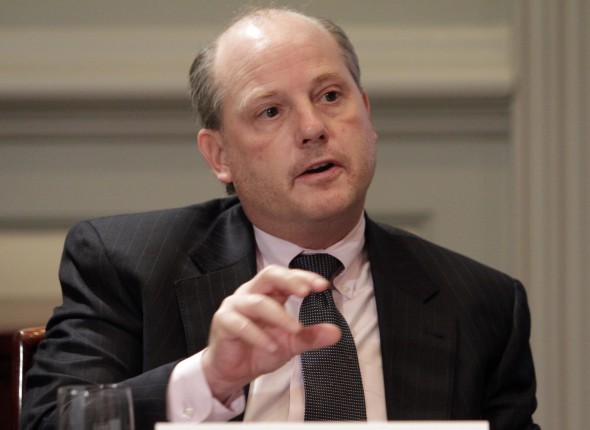|
It is too soon to put limits on US
shareholder democracy
March 25, 2014 1:33 pm
by Andrew Hill
|

Leo Strine - comforter of the corporate executive? (AP Photo/Richard
Drew) |
|
Has shareholder democracy in the US gone too far? The very idea seems
risible to Europe-based corporate governance advocates,
myself included,
who have watched American investor rights advance in a good direction, but
at a snail’s pace. But those making the case now for limiting investor
powers have a strong, prominent, and eloquent ally in Leo Strine, Delaware’s
chief justice. His latest
Columbia Law Review
article, ostensibly arguing for
a pragmatic version of
investor democracy, is a must-read.
Mr Strine is a class act. His 130-page
2004 judgment on Conrad
Black, which described the media magnate as “evasive and
unreliable” sticks in the memory (as it does, apparently, in Conrad Black’s:
he told the FT in 2012, following his release from jail for securities fraud
and obstruction of justice, that the judge was
“a ghastly little twit”).
In the new article, Mr Strine takes on his friend and adversary Lucian
Bebchuk, perhaps the highest-profile academic lobbying for further investor
powers. Prof Bebchuk has lumped Mr Strine in with so-called “insulation
advocates”, who he claims protect highly paid managers from investor
pressure. Mr Strine, with characteristic dry wit, in a footnote, refuses to
accept the description, “except insofar as he is saying that I accept that
it is important for responsible citizens and good consumers to insulate
their homes adequately to keep their homes warmer in winter and reduce
unnecessary energy use”. (Elsewhere in the entertaining footnotes, the judge
cites Eddie Cochran’s song “Summertime Blues” to support one point and
ponders whether Abraham Lincoln would have won re-election in 1861, 1862,
and 1863, if subject to annual votes, as corporate directors now are –
probably not, he concludes.)
Mr Strine does point out, rightly, that there are flaws in shareholder
democracy in the US. For instance, “the segment of the investment community
that is best positioned to vote with an eye toward sustainable value
creation [i.e. index funds] is the least active in exercising voice and
judgment in American corporate governance”. He proposes that index funds
should have to adopt voting policies that reflect “the unique permanent
investment philosophy of their investors”, while reducing their reliance on
proxy advisors such as ISS.
On the votes themselves, he suggests changing elections from annual events
to three- or four-yearly polls:
|
By having stockholder votes on pay occur on a rational schedule,
corporate managers and directors would have a bit more time to focus
on doing their most important function well, which is implementing a
sound and sustainable business strategy to deliver profits for the
corporation’s investors. |
All this will comfort US directors and executives who fear the consequences
of what Mr Strine describes as “direct democracy” of investors, particularly
the rise of short-termist investors. But US boards still enjoy some
remarkable protections from companies’ ultimate owners, and while I can see
that the buzzing of activists is an annoyance and a distraction, I remain
unconvinced that activism is a plague on the US economy. As I wrote in a recent column,
citing recent research
on categories of
activism by Dionysia Katelouzou of King’s College London:
|
Many assumptions about hedge fund activists are myths. They are not
necessarily short-termists (39 per cent of her sample held on for more
than three years), they do not generally seek control, and their
aggressiveness is often overstated because journalists would rather
write about a punch-up than a love-in. |
Mr Strine makes a compelling case for review. But I fear that measures to
curb the irritating short-termists could also kill off those shareholders
who are well-informed and committed to their companies for the long term.
Worse, they could be used by more radical opponents of US shareholder
democracy to destabilise the movement before it has found its footing. Over
to you, Prof Bebchuk.
|
© The Financial Times Ltd 2014 |
|
